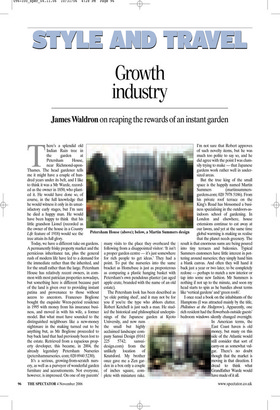Growth industry
James Waldron on reaping the rewards of an instant garden There’s a splendid old Indian Rain tree in the garden at Petersham House, near Richmond-uponThames. The head gardener tells me it might have a couple of hundred years under its belt, and I like to think it was a Mr Warde, recorded as the owner in 1850, who planted it. He would have done so, of course, in the full knowledge that he would witness it only in its unsatisfactory early stages, but I’m sure he died a happy man. He would have been happy to think that his little grandson Lionel (recorded as the owner of the house in a Country Life feature of 1918) would see the tree attain its full glory.
Today, we have a different take on gardens. A permanently frisky property market and the pernicious inheritance tax, plus the general rush of modern life have led to a demand for the immediate rather than the inherited, and for the small rather than the large. Petersham House has relatively recent owners, in common with most patrician properties nowadays, but something here is different because part of the land is given over to providing instant patina and provenance to those without access to ancestors. Francesco Boglione bought the exquisite Wren-period residence in 1995 with money from his insurance business, and moved in with his wife, a former model. But what must have sounded to the distinguished neighbours like a new-money nightmare in the making turned out to be anything but, as Mr Boglione proceeded to buy back land that had previously been lost to the estate. Retrieved from a rapacious property developer, this became, in 2004, the already legendary Petersham Nurseries (petershamnurseries. com; 020 8940 5230).
It’s a serious, growing-from-scratch nursery, as well as a purveyor of wonderful garden furniture and accoutrements. Not everyone, however, is impressed. On one of my parents’ many visits to the place they overheard the following from a disappointed visitor: ‘It isn’t a proper garden centre — it’s just somewhere for rich people to get ideas.’ They had a point. To put the nurseries into the same bracket as Homebase is just as preposterous as comparing a plastic hanging basket with Petersham’s own pendulous planter (an aged apple crate, branded with the name of an old estate).
The Petersham look has been described as ‘ye olde potting shed’, and it may not be for you if you’re the type who abhors clutter. Robert Ketchell is just such a man. He studied the historical and philosophical underpinnings of the Japanese garden at Kyoto University, and now runs the small but highly acclaimed landscape company Sansui Design (0161 225 5742; sansuidesign.com) from the unlikely location of Knutsford. My brother once gave me a Zen garden in a box only a couple of inches square, complete with miniature rake. I’m not sure that Robert approves of such novelty items, but he was much too polite to say so, and he did agree with the point I was clumsily trying to make — that Japanese gardens work rather well in undersized areas.
But the true king of the small space is the happily named Martin Summers (martinsummersgardens.com; 020 7978 5186). From his private roof terrace on the King’s Road has blossomed a business specialising in the outdoors-asindoors school of gardening. In London and elsewhere, house extensions continue to eat away at our lawns, and yet at the same time global warming is making us realise that the planet needs greenery. The result is that enormous sums are being poured into tiny terraces and balconies. Typical Summers customers have little interest in pottering around nurseries; they simply hand him a blank canvas. And often they will hand it back just a year or two later, to be completely redone — perhaps to match a new interior or tap into some new fashion. Mr Summers is nothing if not up to the minute, and soon my head starts to spin as he bandies about terms like ‘vertical gardens’ and ‘green roofs’.
I once read a book on the inhabitants of the Hamptons (I was attracted mainly by the title, Philistines at the Hedgerow). Apparently, one rich resident had the flowerbeds outside guests’ bedroom windows silently changed overnight. In American terms, the East Coast haven is old money, but many on this side of the Atlantic would still consider that sort of carry-on as somewhat vulgar. There’s no doubt though that the market is moving in that direction. I dread to think what Grandfather Warde would have made of it all.


















































































































 Previous page
Previous page